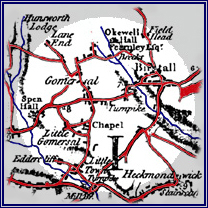


Great Gomersal Little Gomersal Birstall Church |
Gomersal
| The village of Gomersal lies at the heart of industrial
west yorkshire, and was a textile centre for at least 400 years.
It is situated seven miles from the major industrial towns of
Halifax, Huddersfield and Leeds and just five miles from
Bradford, containing several large mansions built by
nineteenth century industrialists. The cloth industry in Gomersal
saw the development of the domestic system whereby clothiers bought
in pieces of cloth for finishing and then took them to the major
cloth markets in Leeds and Halifax for sale. Eventually, in the
late eighteenth century, a cloth
hall market was built in Gomersal itself but it did not last
many years. Gomersal did not have its own church until 1851 (St. Mary's), so prior to that along with the townships of Heckmondwike, Liversedge, Cleckheaton, Tong, Wyke, Hunsworth and Drighlington it belonged to the ancient parish of Birstall and the church owned a large amount of glebeland in Gomersal. It was the home of Charlotte Bronte's great friend Mary Taylor and was the backdrop for her novel 'Shirley' which featured the famous attack by the Luddites on Rawfold's Mill in the neighbouring village of Liversedge in 1812. Another of Charlotte's great friends Ellen Nussey lived nearby in Birstall. Gomersal was an anglo saxon settlement from before the Norman conquest evidence of which includes a late saxon carved stone in Birstall Church and the area is said to have been devastated by William the Conqueror. The Domesday book records that 'Dunstan and Gamel had 14 carucates of land to be taxed where seven ploughs may be'. Local historian H. A. Cadman gives two possible meanings for Gomersal, one that it may be Old English for "the common hall" or "the peoples hall" and the other "Godmoer's corner of land". |